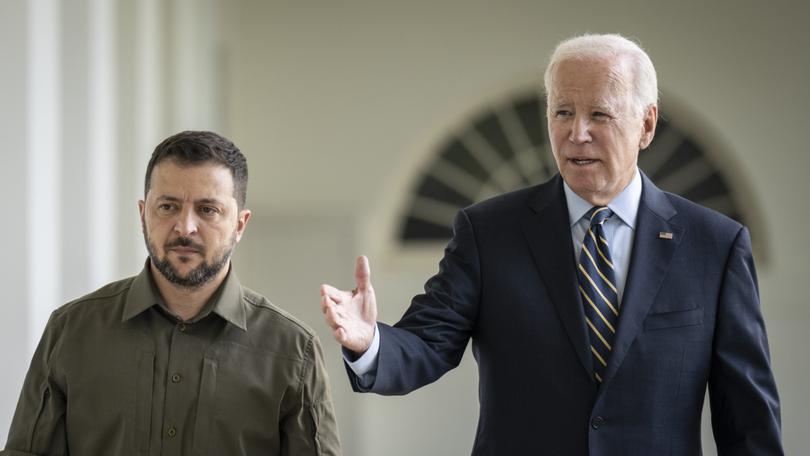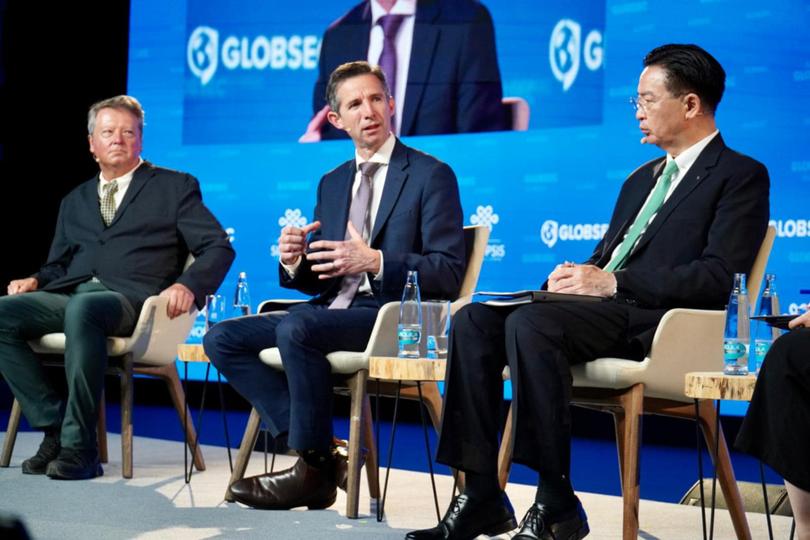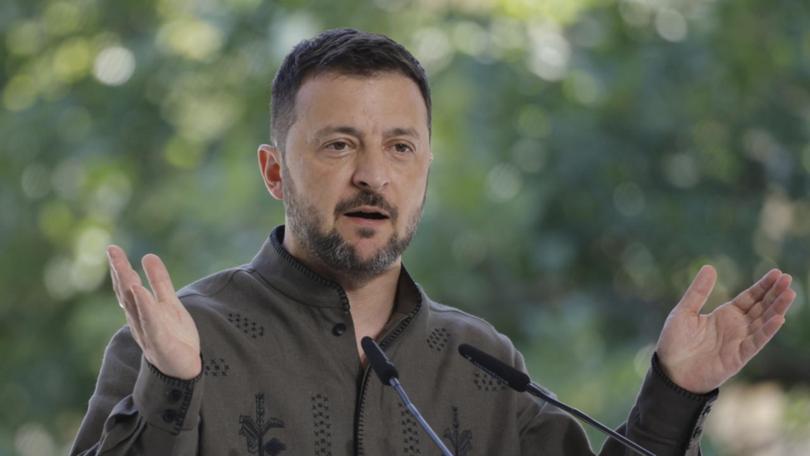Simon Birmingham urges Biden Administration to let Ukraine strike Russia
Joe Biden has been urged to let Ukraine use Western-supplied missiles to strike targets inside Russia with Simon Birmingham saying the war could already be over if Kyiv had been allowed to defend itself.

Simon Birmingham has urged the Biden administration and NATO allies to let Ukraine use Western-supplied missiles to strike targets inside Russia saying the war could already be over if Kyiv had been allowed to defend itself properly from the start.
The Opposition’s foreign affairs spokesman made the comments after becoming the first Australian foreign minister or shadow to visit Ukraine in more than a decade.
In Kyiv, he met with senior Ukrainian Government figures and vowed to reopen Australia’s embassy which the Albanese Government has insisted on keeping closed despite allies all reopening their diplomatic posts within months of Vladimir Putin’s invasion in February 2022.
Sign up to The Nightly's newsletters.
Get the first look at the digital newspaper, curated daily stories and breaking headlines delivered to your inbox.
By continuing you agree to our Terms and Privacy Policy.With the Russian President’s unprovoked war well into its second year, Ukraine’s President Volodymyr Zelensky has pleaded with the United States and NATO allies to allow Ukraine to use long-range missiles to hit Russian bases used to launch attacks on Ukrainian civilians and everyday infrastructure including the electricity grid.
Speaking to an upcoming episode of the Bourke & Ryan podcast on the sidelines of the GLOBSEC summit in Prague where he travelled after visiting Kyiv, Mr Birmingham said allies had curtailed Ukraine’s ability to defend itself for too long.
“There have been some sliding doors moments in this conflict,” he said.
He argued that the war could already have been over if the allies had come to the decisions they belatedly made such as giving Ukraine fighter jets, tanks and long-range missiles much earlier.
“If these things had been decided upon in Ukraine’s favour at an earlier juncture, then Ukraine may well be in a much stronger position or the conflict potentially even over by today,” Mr Birmingham said.
He said this lesson should answer the question about whether or not Ukraine should be allowed to use Western-supplied missiles to strike inside Russian territory as well as whether Ukraine’s neighbours could help shoot down Russian missiles and drones attacking Ukraine.
“These things should be resolved in Ukraine’s favour as well,” he said.
“Because anything that can enhance Ukraine’s ability to stop Russian attacks on Ukraine and to enable Ukraine to focus its efforts on regaining its territory and being in the strongest position for peace negotiations can yield the strongest possible outcome,” he said.

Denmark’s Prime Minister Mette Frederiksen was among the leaders at the GLOBSEC conference to declare that her NATO counterparts needed to abandon their talk about restrictions on Ukraine.
“Self-defence is also about using weapons the other way,” she said.
She pointed to the belated decision to give Ukraine fighter jets – a campaign that Denmark helped successfully lead – and said that Denmark had been ready to donate them F-16s from day one.
“We have given these jets with no restrictions then according to international law,” she said.
Mr Birmingham said he was heartened by these calls.
“I hope that the global partners, particularly the other European leaders and the US hear those messages and act on those messages to give Ukraine that capability to get the upper hand,” he said.
“Ukraine should be able to take out the sites from which missiles are launched against Ukraine, whether they’re in Russia or not.
“That is indeed how many other partners respond, if you look at for example, points in history when US assets in different countries have been attacked, the US targeted, tactical response is usually to strike at the point that those missiles or attacks are launched from.
“In Ukraine’s case, they are at war and they should be able to disable the attacks against them to give them a stronger hand and to make Russia think about whether this war is worth continuing the way they pursue it.”
This week President Zelensky said long-range capabilities were the key to ending the war.
“In these days and weeks, our friends around the world are emphasising how crucial it is to have authorisation for long-range strikes and the corresponding long-range missiles and shells to bring peace closer and save lives,” Mr Zelensky said in one of his regular evening video addresses.
“This depends on President Biden, UK Prime Minister (Keir) Starmer, French President (Emmanuel) Macron, (German) Chancellor (Olaf) Scholz, and others.
“I thank everyone who is convincing the world to be strong and ultimately defeat Russian terror.”

Benjamin Tallis, director of the Democratic Strategy Initiative - a Berlin-based think tank, backed Mr Birmingham’s intervention.
“At the moment Russian bombers are better protected than Ukrainian civilians - because of the restrictions on the use of Western weapons,” Dr Tallis, who also attended the GLOBSEC conference, told The Nightly.
“European allies are turning up the pressure on Washington and Berlin to allow Ukraine to hit targets in Russia because they fear that otherwise, we will end up rewarding Russian aggression and emboldening Putin, creating a dangerous geopolitical grey zone that they are exposed to.”
Part of the West’s reluctance to grant Ukraine permission to use the long-range missiles is out of fear that it will escalate the war and potentially draw in NATO.
Retired US General Ben Hodges who served as commanding general for the US Army Europe said it was terrible policy.
“[And] a manifestation of the fact that we don’t have a clearly defined objective,” he said.
“And so the strategy is ‘Oh My God let’s avoid escalation’ and that’s how you end up with terrible policy like this.”
He said if the US gave the green light to Ukraine to use ATACM missiles, it would pave the way for the UK, Germany and France to allow their equivalents to be deployed.
“Nobody else would be able to hide behind our failure and we would be in a much different place,” he said.
The Polish General Piotr Blazeusz and Eurocorps Commander said the West has imposed red lines on itself only to lift them all with no escalation.
“The governments have to come to terms and don’t worry about Russian-fuelled escalation, because this is not an escalation, this is to allow Ukraine to defend itself,” he said.
“All this discussion about escalation, all this discussion about the use of nuclear weapons – politically a lot of governments get worried.
“But we see the proof that nothing has happened that this is more or less a bluff.”
Late last month Ukraine launched a stunning and audacious offensive into the Russian region of Kursk, President Zelensky said Russia should feel the war on its soil.
NATO’s outgoing Secretary-General Jens Stoltenberg has backed the campaign, describing the campaign as part of Ukraine’s legitimate right to self-defence.
“Ukraine has a right to defend itself. And according to international law, this right does not stop at the border,” he told German weekly Welt am Sonntag.
But he said Ukraine had not told NATO before launching the counteroffensive and was not involved in the campaign.

